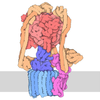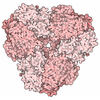[English] 日本語
 Yorodumi
Yorodumi- EMDB-52170: Structure of the Ist2 TMEM16 homology domain in the detergent GDN -
+ Open data
Open data
- Basic information
Basic information
| Entry |  | |||||||||
|---|---|---|---|---|---|---|---|---|---|---|
| Title | Structure of the Ist2 TMEM16 homology domain in the detergent GDN | |||||||||
 Map data Map data | Structure of the N-terminal domain encompassing residues 1-716 of Ist2 purified from S.cerevisiae | |||||||||
 Sample Sample |
| |||||||||
 Keywords Keywords | TMEM16 proteins / lipid scramblase / lipid transport / membrane contact sites / tethering protein / MEMBRANE PROTEIN | |||||||||
| Function / homology |  Function and homology information Function and homology informationStimuli-sensing channels / cellular bud membrane / endoplasmic reticulum membrane organization / regulation of phosphatidylinositol dephosphorylation / cortical endoplasmic reticulum / chloride channel activity / Neutrophil degranulation / chloride transmembrane transport / cell periphery / protein localization to plasma membrane ...Stimuli-sensing channels / cellular bud membrane / endoplasmic reticulum membrane organization / regulation of phosphatidylinositol dephosphorylation / cortical endoplasmic reticulum / chloride channel activity / Neutrophil degranulation / chloride transmembrane transport / cell periphery / protein localization to plasma membrane / lipid binding / plasma membrane Similarity search - Function | |||||||||
| Biological species |  | |||||||||
| Method | single particle reconstruction / cryo EM / Resolution: 2.84 Å | |||||||||
 Authors Authors | Arndt M / Dutzler R | |||||||||
| Funding support |  Switzerland, 1 items Switzerland, 1 items
| |||||||||
 Citation Citation |  Journal: Nat Struct Mol Biol / Year: 2025 Journal: Nat Struct Mol Biol / Year: 2025Title: Structural basis for lipid transport at membrane contact sites by the IST2-OSH6 complex. Authors: Melanie Arndt / Angela Schweri / Raimund Dutzler /  Abstract: Membrane contact sites are hubs for interorganellar lipid transport within eukaryotic cells. As a principal tether bridging the endoplasmic reticulum (ER) and the plasma membrane in Saccharomyces ...Membrane contact sites are hubs for interorganellar lipid transport within eukaryotic cells. As a principal tether bridging the endoplasmic reticulum (ER) and the plasma membrane in Saccharomyces cerevisiae, the protein IST2 has a major role during lipid transport between both compartments. Here, we show a comprehensive investigation elucidating the structural and mechanistic properties of IST2 and its interaction with the soluble lipid transfer protein OSH6. The ER-embedded transmembrane domain of IST2 is homologous to the TMEM16 family and acts as a constitutively active lipid scramblase. The extended C terminus binds to the plasma membrane and the phosphatidylserine-phosphatidylinositol 4-phosphate exchanger OSH6. Through cellular growth assays and biochemical and structural studies, we characterized the interaction between both proteins and show that OSH6 remains associated with IST2 during lipid shuttling between membranes. These results highlight the role of the IST2-OSH6 complex in lipid trafficking and offer initial insights into the relevance of scramblases for carrier-like lipid transport mechanisms. | |||||||||
| History |
|
- Structure visualization
Structure visualization
| Supplemental images |
|---|
- Downloads & links
Downloads & links
-EMDB archive
| Map data |  emd_52170.map.gz emd_52170.map.gz | 391 MB |  EMDB map data format EMDB map data format | |
|---|---|---|---|---|
| Header (meta data) |  emd-52170-v30.xml emd-52170-v30.xml emd-52170.xml emd-52170.xml | 18 KB 18 KB | Display Display |  EMDB header EMDB header |
| FSC (resolution estimation) |  emd_52170_fsc.xml emd_52170_fsc.xml | 18 KB | Display |  FSC data file FSC data file |
| Images |  emd_52170.png emd_52170.png | 94.1 KB | ||
| Filedesc metadata |  emd-52170.cif.gz emd-52170.cif.gz | 6.5 KB | ||
| Others |  emd_52170_half_map_1.map.gz emd_52170_half_map_1.map.gz emd_52170_half_map_2.map.gz emd_52170_half_map_2.map.gz | 390.8 MB 390.8 MB | ||
| Archive directory |  http://ftp.pdbj.org/pub/emdb/structures/EMD-52170 http://ftp.pdbj.org/pub/emdb/structures/EMD-52170 ftp://ftp.pdbj.org/pub/emdb/structures/EMD-52170 ftp://ftp.pdbj.org/pub/emdb/structures/EMD-52170 | HTTPS FTP |
-Related structure data
| Related structure data |  9hheMC  9hdhC  9hdkC  9qjaC  9qjtC  9qjuC M: atomic model generated by this map C: citing same article ( |
|---|---|
| Similar structure data | Similarity search - Function & homology  F&H Search F&H Search |
- Links
Links
| EMDB pages |  EMDB (EBI/PDBe) / EMDB (EBI/PDBe) /  EMDataResource EMDataResource |
|---|---|
| Related items in Molecule of the Month |
- Map
Map
| File |  Download / File: emd_52170.map.gz / Format: CCP4 / Size: 421.9 MB / Type: IMAGE STORED AS FLOATING POINT NUMBER (4 BYTES) Download / File: emd_52170.map.gz / Format: CCP4 / Size: 421.9 MB / Type: IMAGE STORED AS FLOATING POINT NUMBER (4 BYTES) | ||||||||||||||||||||||||||||||||||||
|---|---|---|---|---|---|---|---|---|---|---|---|---|---|---|---|---|---|---|---|---|---|---|---|---|---|---|---|---|---|---|---|---|---|---|---|---|---|
| Annotation | Structure of the N-terminal domain encompassing residues 1-716 of Ist2 purified from S.cerevisiae | ||||||||||||||||||||||||||||||||||||
| Projections & slices | Image control
Images are generated by Spider. | ||||||||||||||||||||||||||||||||||||
| Voxel size | X=Y=Z: 0.651 Å | ||||||||||||||||||||||||||||||||||||
| Density |
| ||||||||||||||||||||||||||||||||||||
| Symmetry | Space group: 1 | ||||||||||||||||||||||||||||||||||||
| Details | EMDB XML:
|
-Supplemental data
-Half map: Half-map B of Structure of the N-terminal domain...
| File | emd_52170_half_map_1.map | ||||||||||||
|---|---|---|---|---|---|---|---|---|---|---|---|---|---|
| Annotation | Half-map B of Structure of the N-terminal domain encompassing residues 1-716 of Ist2 purified from S.cerevisiae | ||||||||||||
| Projections & Slices |
| ||||||||||||
| Density Histograms |
-Half map: Half-map A of Structure of the N-terminal domain...
| File | emd_52170_half_map_2.map | ||||||||||||
|---|---|---|---|---|---|---|---|---|---|---|---|---|---|
| Annotation | Half-map A of Structure of the N-terminal domain encompassing residues 1-716 of Ist2 purified from S.cerevisiae | ||||||||||||
| Projections & Slices |
| ||||||||||||
| Density Histograms |
- Sample components
Sample components
-Entire : Homodimer of N-terminal domain of Ist2
| Entire | Name: Homodimer of N-terminal domain of Ist2 |
|---|---|
| Components |
|
-Supramolecule #1: Homodimer of N-terminal domain of Ist2
| Supramolecule | Name: Homodimer of N-terminal domain of Ist2 / type: complex / ID: 1 / Parent: 0 / Macromolecule list: all |
|---|---|
| Source (natural) | Organism:  |
-Macromolecule #1: Increased sodium tolerance protein 2
| Macromolecule | Name: Increased sodium tolerance protein 2 / type: protein_or_peptide / ID: 1 / Number of copies: 2 / Enantiomer: LEVO |
|---|---|
| Source (natural) | Organism:  |
| Molecular weight | Theoretical: 87.777375 KDa |
| Recombinant expression | Organism:  |
| Sequence | String: MDEKTTGWRG GHVVEGLAGE LEQLRARLEH HPQGQREPEQ KLISEEDLGT LEVLFQGPSS QTITSLDPNC VIVFNKTSSA NEKSLNVEF KRLNIHSIIE PGHDLQTSYA FIRIHQDNAK PLFSFLQNLD FIESIIPYHD TELSDDLHKL ISISKSKILE A PKQYELYN ...String: MDEKTTGWRG GHVVEGLAGE LEQLRARLEH HPQGQREPEQ KLISEEDLGT LEVLFQGPSS QTITSLDPNC VIVFNKTSSA NEKSLNVEF KRLNIHSIIE PGHDLQTSYA FIRIHQDNAK PLFSFLQNLD FIESIIPYHD TELSDDLHKL ISISKSKILE A PKQYELYN LSNLTNNPKQ SLYFAFLQNY IKWLIPFSFF GLSIRFLSNF TYEFNSTYSL FAILWTLSFT AFWLYKYEPF WS DRLSKYS SFSTIEFLQD KQKAQKKASS VIMLKKCCFI PVALLFGAIL LSFQLYCFAL EIFIKQIYNG PMISILSFLP TIL ICTFTP VLTVIYNKYF VEPMTKWENH SSVVNAKKSK EAKNFVIIFL SSYVPLLITL FLYLPMGHLL TAEIRTKVFN AFSI LARLP THDSDFIIDT KRYEDQFFYF IVINQLIQFS MENFVPSLVS IAQQKINGPN PNFVKAESEI GKAQLSSSDM KIWSK VKSY QTDPWGATFD LDANFKKLLL QFGYLVMFST IWPLAPFICL IVNLIVYQVD LRKAVLYSKP EYFPFPIYDK PSSVSN TQK LTVGLWNSVL VMFSILGCVI TATLTYMYQS CNIPGVGAHT SIHTNKAWYL ANPINHSWIN IVLYAVFIEH VSVAIFF LF SSILKSSHDD VANGIVPKHV VNVQNPPKQE VFEKIPSPEF NSNNEKELVQ RKGSANEKLH QELGEKQPAS SANGYEAH A ATHANNDPSS LSSASSPSLS SSSSSSKTGV VKAVDNDTAG SAGKKPLATE STEA UniProtKB: Increased sodium tolerance protein 2 |
-Experimental details
-Structure determination
| Method | cryo EM |
|---|---|
 Processing Processing | single particle reconstruction |
| Aggregation state | particle |
- Sample preparation
Sample preparation
| Concentration | 2.56 mg/mL |
|---|---|
| Buffer | pH: 7.6 |
| Grid | Model: Quantifoil R1.2/1.3 / Material: GOLD / Mesh: 200 / Support film - Material: CARBON |
| Vitrification | Cryogen name: ETHANE-PROPANE / Chamber humidity: 100 % / Chamber temperature: 4 K / Instrument: FEI VITROBOT MARK IV |
- Electron microscopy
Electron microscopy
| Microscope | TFS KRIOS |
|---|---|
| Specialist optics | Energy filter - Name: GIF Bioquantum / Energy filter - Slit width: 20 eV |
| Image recording | Film or detector model: GATAN K3 BIOQUANTUM (6k x 4k) / Average electron dose: 62.43 e/Å2 |
| Electron beam | Acceleration voltage: 300 kV / Electron source:  FIELD EMISSION GUN FIELD EMISSION GUN |
| Electron optics | Illumination mode: FLOOD BEAM / Imaging mode: BRIGHT FIELD / Cs: 2.7 mm / Nominal defocus max: 2.4 µm / Nominal defocus min: 1.0 µm / Nominal magnification: 130000 |
| Sample stage | Specimen holder model: FEI TITAN KRIOS AUTOGRID HOLDER / Cooling holder cryogen: NITROGEN |
| Experimental equipment |  Model: Titan Krios / Image courtesy: FEI Company |
 Movie
Movie Controller
Controller
















 Z (Sec.)
Z (Sec.) X (Row.)
X (Row.) Y (Col.)
Y (Col.)






































